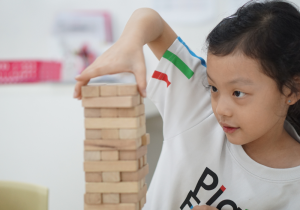Creative Math: Studies have found that a positive attitude toward math boosts the brain’s memory center and improves math performance.
Here we explore the 5 ways that PlayFACTO School’s Creative Math approach provides a positive attitude toward math.
1. We provide opportunities for success to boost confidence.

We start with simple problems and slowly move to the more complicated ones. Encouraging children to retry challenging problems that they have failed to solve after learning and understanding more. This way they achieve success and their confidence in math increases.
2. We encourage perseverance when solving math problems.

Explain that it is ok to be confused by a problem and try many different ways to get to the solution. It is all part of learning. Practicing perseverance to work through the initial frustration of not knowing where to start is the first step to building problem-solving resilience in students.
3. We give constructive feedback.

Give children constructive and honest feedback without praise or judgment. For example “I’m noticing that you know how to solve one-digit by two-digit multiplication and you need more practice with two-digit by two-digit multiplication. Pay more attention to the place value.”
4. We teach Problem-solving Strategies.

Encourage children to experiment with different approaches when solving problems. There is often more than one way to solve a math problem. Teach problem-solving strategies that will help them tackle different types of problems. Here are some ways we teach problem-solving strategies:
1. Creating a Diagram or Drawing a picture
2. Guessing and checking
3. Making a table or a list
4. Logical reasoning.
5. We make practice fun!

Practice drills are required for better understanding, fluency, and automation. However, repeated practice can often become boring and tiring. Give practice assignments in chunks and keep them short. Try out many different ways of practicing like worksheets, digital games, board/card games, and even physically active games. Provide manipulatives for better understanding. Design your own games with themes and toys that your child will enjoy, like toy cars, dolls, blocks, and more. You know your child better than anyone and you know what gets them excited. Make practice time a fun time. You can find many ideas online on how to use everyday objects and toys like legos to practice math.
Find out more about our 38 Collaborative Learning Centres Islandwide!

H/T: Mathcurious
Speak to us today to find out more about our 38 student care centres!
Click Here to whatsapp us for a complimentary tour of a centre near you.










